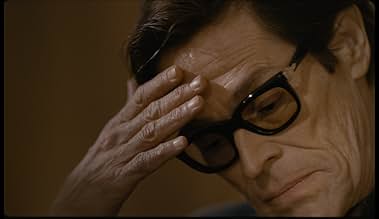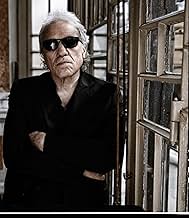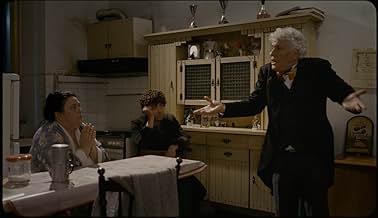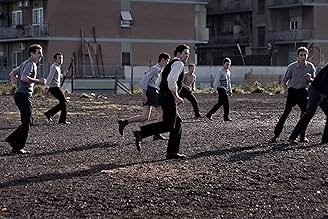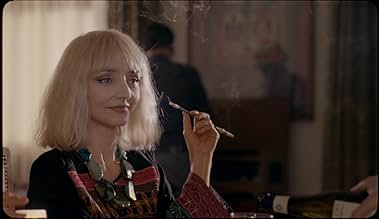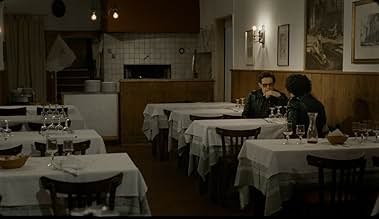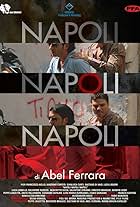IMDb RATING
5.9/10
4.8K
YOUR RATING
A kaleidoscopic look at the last day of Italian filmmaker Pier Paolo Pasolini in 1975.A kaleidoscopic look at the last day of Italian filmmaker Pier Paolo Pasolini in 1975.A kaleidoscopic look at the last day of Italian filmmaker Pier Paolo Pasolini in 1975.
- Director
- Writers
- Stars
- Awards
- 2 wins & 5 nominations total
Luca Lionello
- Narrator
- (voice)
Guillaume Rumiel Braun
- Interviewer
- (as Lucien Rumiel)
- Director
- Writers
- All cast & crew
- Production, box office & more at IMDbPro
Featured reviews
An observational glimpse on the last hours of the famed and controversial Italian director Pier Paolo Pasolini, "Pasolini" is a glacial record of art and society in 1970s Italy. Willem Dafoe plays the complicated artist highlighting the man's torment and humanity. The real life Pasolini's oddball intensity is missing in this portrayal; rather, Dafoe embodies a reserved, cultured homosexual who lived the opposite worlds of cultivated society and the seamy underworld. Amidst this depiction is the backdrop of a turbulent Rome in the throes of political and social unrest. Being an Abel Ferrara flick there's nudity and some graphic sex (both straight and gay) that provides some chuckles and titillation. While not for everyone this highbrow and arty film serves as a compelling tribute to one of the most fascinating artistic figures of the 20th-Century.
I remember the reporting on the sordid killing of poet and director, Pier Paolo Pasolini but was stunned to learn it took place as long ago as 1975, just after the completion of Salo. The last day or so of Pasolini's life is told here in a fittingly realistic and dark way but with clips from that last (very difficult) film and newly shot sequences from the director's script for a newly proposed enterprise, once more mixing the magical the religious and downright dirty. Ferrara is, of course, as uncompromising man as his subject and this believable portrait is simply that rather than some flattering or ego boosting enterprise. Willem Dafoe's performance is quite amazing and the look he achieves quite uncanny, Having an Italian wife who adored Pasolini seems to have helped him with this but it is a truly astonishing performance within a very good film. Neither Ferrara nor Pasolini have produced work that is the easiest to enjoy but nor can either be ignored.
Defoe is not demanded. A documentary would be more enjoyable, if this could be said.
Abel Ferrara's long-gestated biopic of Pier Paolo Pasolini has its congenital defect, by cast Willem Dafoe (albeit his striking physical resemblance) as the maestro, hence, the prominent anglophone dialog is rightly incongruous with its milieu and becomes more problematic because the rest Italian cast must follow suit, even for the venerable actress Adriana Asti, who plays Pasolini's senior mother, during a family and friend home-gathering, has to awkwardly keep the conversation going in her heavily accented English, that is a misstep to cut right through a naturally intimate occasion where could have spoken volumes of the internal discord. This language hitch is too big to ignore also because it is erratic, Dafoe manages to converse small talks in Italian (although the credit on IMBb listing that the voice is dubbed), but when he needs to express Pasolini's ideology, he switches to English, as he confesses during the interview with journalist Furio Colombo (Siciliano), paraphrasing here "it is better for me to write than speak about my thoughts", so Ferrara's indecision to stick to one solution chips away the film's potency.
The film begins just days before Pasolini's shocking demise, but Ferrara judiciously doesn't tap into the juicier conspiracy theories spawned from it henceforth, and Dafoe's performance is restrained most of the time, pensively buries his self-consciousness of the impending quietus, his Pasolini is benevolent, intelligent and impermeable. The film only fitfully weaves flashback into its slender narrative (an 84-minute length), the sexual experience in his youth and rambling, indeterminate thoughts, but one of the merits is that Ferrara pays his reverence to piece together Pasolini's unfinished film, envisioning an idiosyncratic "messiah-seeking" journey starring Pasolini's "great love of his life" Ninetto Davoli as Epifanio and Riccardo Scamarcio as Davoli himself answering their calling and witnessing an annual heterosexual copulation ceremony (in the name of procreation) between gays and lesbians (celebrated with pyrotechnics) en route until a cosmic ending commensurate with Pasolini's own fate.
The film is chromatically enveloped with a blue-tinted pall of a grubby Rome in the 70s, and when the brutal crunch finally descends on the night of November 2nd, 1975, Ferrara chooses a more pedestrian cause for the attack but injects his condemnation with one glimpse-or-you-will-miss-it shot where the homophobic perpetrators run over a badly beaten Pasolini when hurrying off the place in his vehicle, it could be the final blow extinguishing his last breath, whether it is intentional or accidental, either way, Ferrara hits home with the happening's incomprehensible cruelty.
Poignancy reaches its apex in Asti's heart-rending breakdown through Maria de Medeiros' Laura Betti, attendant with Callas' stentorian threnody. Ferrara's PASOLINI is a disciple's deferential and cerebral homage to a mentor, whom he has never met and whose myth has been perpetuating around us ever since the horrific tragedy.
The film begins just days before Pasolini's shocking demise, but Ferrara judiciously doesn't tap into the juicier conspiracy theories spawned from it henceforth, and Dafoe's performance is restrained most of the time, pensively buries his self-consciousness of the impending quietus, his Pasolini is benevolent, intelligent and impermeable. The film only fitfully weaves flashback into its slender narrative (an 84-minute length), the sexual experience in his youth and rambling, indeterminate thoughts, but one of the merits is that Ferrara pays his reverence to piece together Pasolini's unfinished film, envisioning an idiosyncratic "messiah-seeking" journey starring Pasolini's "great love of his life" Ninetto Davoli as Epifanio and Riccardo Scamarcio as Davoli himself answering their calling and witnessing an annual heterosexual copulation ceremony (in the name of procreation) between gays and lesbians (celebrated with pyrotechnics) en route until a cosmic ending commensurate with Pasolini's own fate.
The film is chromatically enveloped with a blue-tinted pall of a grubby Rome in the 70s, and when the brutal crunch finally descends on the night of November 2nd, 1975, Ferrara chooses a more pedestrian cause for the attack but injects his condemnation with one glimpse-or-you-will-miss-it shot where the homophobic perpetrators run over a badly beaten Pasolini when hurrying off the place in his vehicle, it could be the final blow extinguishing his last breath, whether it is intentional or accidental, either way, Ferrara hits home with the happening's incomprehensible cruelty.
Poignancy reaches its apex in Asti's heart-rending breakdown through Maria de Medeiros' Laura Betti, attendant with Callas' stentorian threnody. Ferrara's PASOLINI is a disciple's deferential and cerebral homage to a mentor, whom he has never met and whose myth has been perpetuating around us ever since the horrific tragedy.
Sometimes a director wants to pay hommage to a past legend. We have seen it many times with talented directors like Tarentino, De Palma and others. You tell a story and you insert scenes like the masters and you move on, please don't ruin the mystique of masters of illusion by doing boring A DAY IN THE LIFE OF....
When you try to shoot biographical episodes, you are doing a high wire act in high winds. You are most likely to fall flat on your face and seriously injure your reputation. This is the case here.
PPP was a shock jock whot reveled in visual controversy and in his writings. He was a combo of Bunuel-Dali-Picasso-Zola. To show his last day was about as interesting as reading the one word Twas and closing the book on A christmas carol.
Move on people! there is NO story here
Storyline
Did you know
- TriviaNinetto Davoli, who plays Epifanio in this film, has acted in many of Pier Paolo Pasolini's films and was, for a period of time, his lover. He is also a character in the film, played by Riccardo Scamarcio.
- GoofsLaura Betti (Maria de Medeiros) brings a record as a gift to Pasolini and mentions that it is "traditional Croatian music", but the song that is played from the record is in fact Macedonian.
- Quotes
Pier Paolo Pasolini: Let me be frank to you.
Pier Paolo Pasolini: I have been to hell and I know things that don't disturb other people's dreams
- ConnectionsFeatured in Sportin' Life (2020)
- How long is Pasolini?Powered by Alexa
Details
Box office
- Gross US & Canada
- $30,757
- Opening weekend US & Canada
- $8,362
- May 12, 2019
- Gross worldwide
- $551,192
- Runtime1 hour 24 minutes
- Color
- Sound mix
- Aspect ratio
- 1.85 : 1
Contribute to this page
Suggest an edit or add missing content



